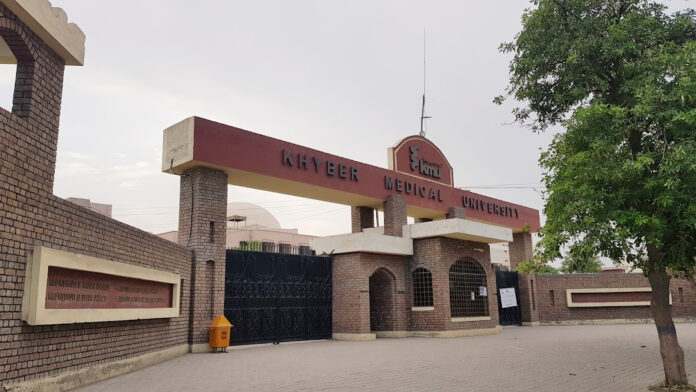PESHAWAR: A medical university in northwest Pakistan and the country’s top education body have given their initial approval for setting up a campus in Kabul to help to rebuild Afghanistan’s health sector, Pakistani and Afghan officials said on Saturday. Since the Taliban took over Afghanistan in August last year, the group has been making desperate attempts to rebuild key sectors, including health, education and banking.
In December, an eight-member Afghan delegation, led by acting Higher Education Minister Abdul Baqi Haqqani, visited Islamabad for talks on cooperation between the two countries in the fields of education and research.
Last week, officials of the Khyber Medical University (KMU) and a delegation of the Afghan consulate general in Peshawar held a marathon meeting on the proposed KMU campus in Kabul, according to KMU Vice-Chancellor Dr. Ziaul Haq.
“The KMU syndicate has already given approval for the idea of the establishment of an offshore campus in Kabul,” Haq told Arab News.
“Preparations have already been done and we can make the campus operational within four months after approval by Pakistan’s Foreign Office and other concerned departments.”
Thousands of Afghan students have graduated from Pakistani universities, many of them on scholarships, during decades of conflict in the neighboring country. But the exodus of skilled workforce after the withdrawal of foreign forces has left Afghanistan struggling on many fronts.
Zabihullah Mujahid, a spokesman for the Taliban government, told Arab News that decades of war and turmoil had compounded their problems and damaged his country’s infrastructure, including the health sector.
“We appreciate Pakistan’s consistent support in these hours of turbulence. Afghanistan direly needs its health sector repaired so that my people get treatment at home,” he said.
“This is in its initial stages but the Islamic Emirate will pursue this because we need great support in the health sector. It will bring the two neighbors closer.”
Situated in Peshawar, the KMU is the only public sector medical university in Khyber Pakhtunkhwa, playing a lead role in improving the quality of medical education in the northwestern Pakistani province, according to the KMU vice-chancellor.
The university has a thriving research enterprise and is labelled as a “research-intensive” institute by the Higher Education Commission (HEC), which funds, oversees, regulates and accredits higher education institutions in Pakistan. The varsity has 10 constituent institutes and more than a hundred affiliated medical and dental colleges and allied health institutions.
Barrister Mohammad Ali Saif, a provincial government spokesperson, said Pakistan had been striving to build good relations with Afghanistan and take part in rebuilding institutions of the war-battered country.
“This is a really commendable step by the KMU, which will simultaneously help to ensure provision of medical education to Afghan students and health facilities to Afghan patients in their country, instead of their coming all the way to Pakistan,” he said.
He said the provincial government had always extended a helping hand to Afghanistan and the establishment of KMU campus in Kabul would further cement bilateral ties between the two countries.
Haq said about 500-600 Afghan students were studying in different disciplines, including Bachelor of Medicines and Surgery (MBBS), Bachelor of Dental Surgery (BDS), health sciences and physiotherapy, at the KMU.
“We had written to the HEC Islamabad that Pakistan had already established Jinnah Hospital in Kabul, which would help us affiliate the planned campus, which will be helpful for us to realize the idea,” he said.
The 200-bed Jinnah Hospital, one of the largest health facilities in Afghanistan, was funded by the Pakistani government and opened in April 2019.
According to the letter addressed to the HEC, the KMU stated the current circumstances, following the withdrawal of foreign forces from Afghanistan and the subsequent exodus of the already thin skilled workforce, have created a human resource vacuum in the neighboring country.
In response, the HEC said it encouraged the initiative of Pakistani higher education institutes to establish their offshore campuses as the internationalization of higher education has become a priority for many universities.
Haq said the KMU would proceed with the establishment of its Kabul campus as per the HEC guidelines and in consultation with the provincial and federal governments.
Behram Jan, a senior project manager at the HEC, said thousands of Afghan students had been enrolled in Pakistani universities under the Allama Iqbal Scholarship program, and the idea of establishing a KMU campus in Kabul was under consideration to facilitate them in their own country.
The AIS program was launched in 2009, and thousands of Afghans have so far benefited from it, gaining degrees in various fields including medicine and engineering. At least 100 seats are reserved for female students as part of the scholarship each year.

